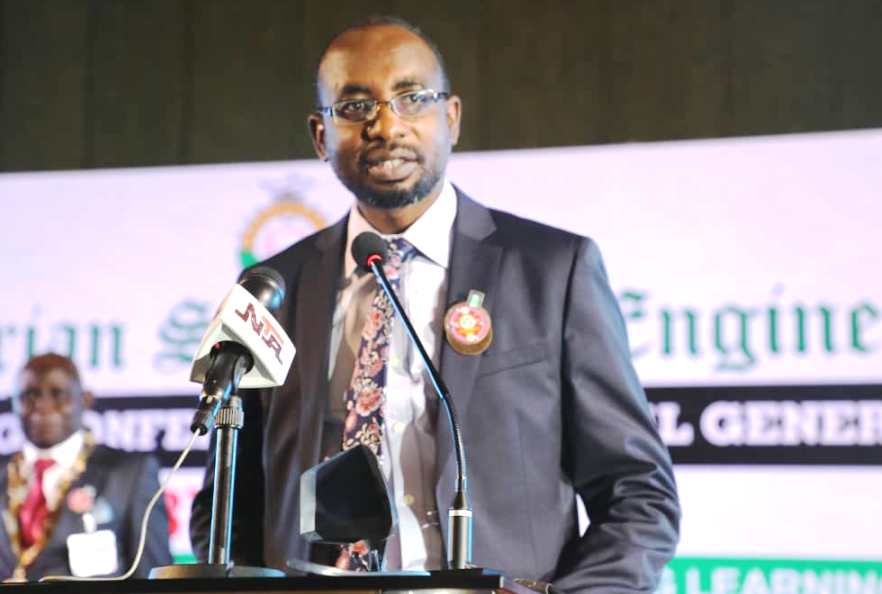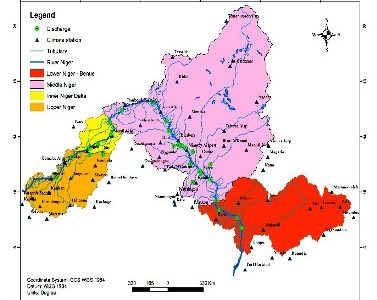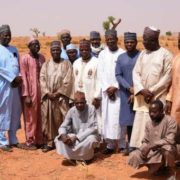

Audience at the ICT Week
INTRODUCTION
I am glad and happy to be in your midst today to give a keynote speech on Nigeria’s Roadmap to Digital Transformation and its impact on the socio-economic development of the Nation. This event very much aligns with our mandate at NITDA, which is to develop and transform the Digital Economy sector of this great Nation by setting up the necessary regulatory and governance framework that will stimulate the growth of the Digital Economy ecosystem. The ICT week is therefore part of Nigeria is ready campaign and provides a suitable platform to share our experiences in our journey of digital transformation. As an Agency we have made the strategic decision of joining this global trend and the 4IR.
RELATED FG Committed To Driving National Strategy On Digital Economy, Says NITDA’s Boss At Anambra Innovation Meet
Research reports have valued digital economy at about $11.5 trillion which is almost equivalent to 16% of global GDP (Huawei ad Oxford Economics). The world economic forum on the other hand predicts that 60% of global GDP will be digitized by 2022 and over the next decade digital platform will be used to create 70% of new values and jobs, in addition future of jobs report of 2020 estimates that 97 million new jobs will be created between 2020 and 2025 of which about 80% will be outsourced. Again, McKinsey report reveals that digital economy in Africa is expected to grow to over $300 billion by 2025.
NIGERIA’S ROADMAP TO DIGITAL TRANSFORMATION: TOWARDS ACHIEVING NATIONAL SOCIAL AND ECONOMIC DEVELOPMENT
Having established this fact, the redesignation of the Ministry of Communication as Federal Ministry of communication and Digital Economy in 2019 marks a watershed in the Digital transformation journey. This was followed by the official launching of NDEPS in this same year which was also a timely strategic action that has positioned the country to take advantage of the many opportunities provided by the paradigm shift.
Furthermore, the unveiling of the Strategic Road Map and action Plan in 2021 again provides the platform for the implementation of the provisions of NDEPS which is pivotal to transforming the country into a sustainable digital economy
Indeed, digital transformation, which could be likened to another term for the Fourth Industrial Revolution, is forcing a paradigm shift in business operations, systems and processes, and expanding the possibilities for improvements in output, productivity, efficiency and export competitiveness. The COVID-19 pandemic had also caused a shift that has reshaped the global business landscape and dramatic impact on internet traffic as most activities increasingly took place online. This has hastened the adoption of key technologies such as mobility, cloud computing, business intelligence, and social media. These technologies are transforming businesses, Governments and are sparking a new wave of wealth creation.
For instance, in the last three years African tech ecosystem have grown in leaps and bounds as they continue to receive attention of global players with African based tech startup raising more than $4billion in 2021 alone. Nigerian Fintech ecosystem maintained its growth trajectory within the African continent with the addition of 3 more unicons. Several trends are now emerging with core banking in the cloud showing significant potential to disrupt the traditional branch contact banking and offer innovative service. Digital only bank is now taking the centre in the financial system and formidable competition from the fintech companies means that players late to agency banking rave will struggle to gain traction.
With tectonic changes in global digital dynamics and the unprecedented level of transaction platformisation and digitization of processes and services, there is a challenging gap of taking the advantage of evolving digital industry for national economic development.
This will require a complete overhaul of the supply pipeline in the area of skills and talents, complete value reorientation and an innovative approach to skills and tech entrepreneurship development. While we recognize the ocean boiling strategy through which the digital ecosystem has evolved over time, the Agency has been in the fore front of catalysing a new approach towards supporting the emergence of a viable digital ecosystem.
LOOKING AHEAD
The NITDA Strategic RoadMap and Action Plan 2021-2024 provides a veritable compass for navigating the volatile, uncertain and dynamic digital industry. The priority programmes in this plan is anchored on 7 strategic pillars with four of these pillars specifical targeting the re-kickstarting and reinvigorating the digital ecosystem. For instance four of the strategic pillars of this roadmap, Digital Regulation speaks to cocreating regulations that will catalyse market creating innovations, Digital Literacy and Skills: Development and adoption of digital literacy standards for Nigeria. Digital Transformation: Transformation of government services and processes by leveraging digital technologies. Digital Innovation & Entrepreneurship: Creation of an ecosystem for Innovation Driven Enterprises and improved contribution of ICT to the nation’s GDP; have been strategically carved, all geared towards driving Nigeria to a sustainable Digital Economy.
The implementation of the SRAP is anchored on partnership, and stakeholder collaboration either public or private, indigenous or international as long as the vision and values align with our propositions
“In the last three years African tech ecosystem have grown in leaps and bounds as they continue to receive attention of global players with African based tech startup raising more than $4billion in 2021 alone”
For instance, in collaboration with Mass Challenge, we organized series of competition among the youths that seeks to ‘reboot’ equality by inspiring fresh and energetic approaches to digital inclusion, entrepreneurship, and skills development. We did this so that innovators can create business models that give everyone an equal chance to seize the opportunities brought about by technological change. In collaboration with NEPC we supported 6 startup to secure a grant of N300 million naira through the Export Expansion Scheme Pprogramme which is unprecedented and perhaps the first of its kind, still in collaboration with NEPC we took about 5 startup to IATF to leverage on the provision of African Free Trade Agreement for export digital services to Sub-Saharan Africa. We have also taken some of our tech startup to other international exhibitions and events and some them have won international awards
National Centre for Artificial Intelligence and Robotics and Office of Nigerian Digital Innovation are two special purpose vehicles for deploying digital innovation, Research Creativity, and local content. Recently NCAIR in collaboration with the Japanese International Corporation Agency is currently running a two-year incubation program that will lead to the development of strategies for successful ecosystems of digital transformation.
The Agency is also collaborating higher institution through our HIVE programme to challenge student to develop digital solutions to solve their peculiar challenges within their faculties. We are also supporting the ecosystem through the TIES program designed to support hub owners to develop the digital skills and talents required by the ecosystem. The MIT-REAP programme is also designed to catalyse the innovation ecosystem in creating innovation driven enterprises leveraging on strength, uniqueness and peculiarities of the ecosystem stakeholders.
The Agency is poised to making Nigeria a digital talent hub for Africa through leveraging on the various community-based programme and other strategic initiatives designed to harness the latent digital talents and transform them to productive digital skills required to grow the digital tech ecosystem.
CONCLUSION
As we prepare to enter the final decade of the 2030 Sustainable Development Agenda, it is imperative that we give priority to embracing the technological innovations of the Fourth Industrial Revolution to address our most pressing development challenges.
At NITDA, we are prepared to adapt to our fast-changing world, we have the potential to unleash fresh waves of creativity and innovation and create new sources of sustainable growth and jobs. In addition, we are critically re-positioning and building on existing knowledge and frameworks, issues of interest in this area, such as infrastructure, Human Resource, Investments and Governance in terms of Regulations and Policies. We can see this in the various policies targeted towards catalysing market creating innovation and creating new industry, one of such has given birth to Nigeria Data Bureau. The startup bill which has been approved by FEC, The DTTWG which is a public sector platform for deepening digital transformation within the public sector.
Finally, I wish to express my sincere and profound appreciation for the opportunity to deliver this keynote. I therefore wish to invite all stakeholder to come and partner, collaborate and cocreate with us new digital future for a sustainable digital Nigeria
Thank you all for your audience.
This is the keynote message delivered by Kashifu Inuwa Abdullahi, CCIE, Director General/CEO, National Information Technology Dev. Agency (NITDA) at The Nigeria ICT Week & Awards 2022 with the theme “Nigeria’s Roadmap To Digital Transformation: Towards Achieving National Social And Economic Development.”































